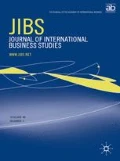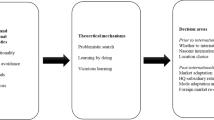Abstract
This paper compares the predictions of transaction cost and institutional theories in an empirical study of the entry mode choice for 1,194 Japanese foreign subsidiaries. The findings indicate the institutional model adds significant explanatory power over and above the predictions of the transaction cost model. Using the concepts of frequency-based, trait-based and outcome-based imitation, I find support for institutional isomorphism, as later entrants tended to follow the entry mode patterns established by earlier entrants. Isomorphic behavior was also present within a firm, as firms exhibited consistency in entry mode choices across time. Further, a firm's investment experience moderated institutional influences on entry mode choice.
Similar content being viewed by others
Author information
Authors and Affiliations
Rights and permissions
About this article
Cite this article
Lu, J. Intra- and Inter-organizational Imitative Behavior: Institutional Influences on Japanese Firms' Entry Mode Choice. J Int Bus Stud 33, 19–37 (2002). https://doi.org/10.1057/palgrave.jibs.8491003
Published:
Issue Date:
DOI: https://doi.org/10.1057/palgrave.jibs.8491003




